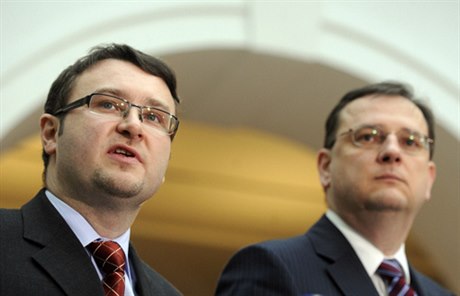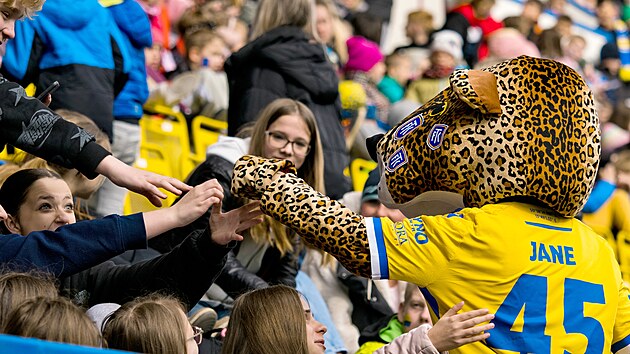Details of the regional assembly of the Moravian–Silesian branch of the Civic Democrats (ODS) were not supposed to be leaked to the public. Some participants warn that if this happens it will seriously damage the center-right party. So what happened at their meeting in Ostrava at the end of January?
The Moravian–Silesian branch of the ODS elected a leader for the looming regional elections: David Sventek, director of the Regional Council, which distributes billions of crowns from the European Union to Northern Moravia. However, the election was far from smooth, and the consequences could weaken Czech prime minister and party leader Petr Nečas, who will try to extend his mandate at a party congress at the end of the year.
According to information received by Czech Position, a significant number of assembly delegates supported the opposing candidate, Dalibor Madej — and not for banal reasons.
Sventek, who received 45 votes, appeared to have everything going for him. He had highly placed party officials on his side who were regarded as Nečas’s people in the region: Pavel Drobil, vice-chairman of the ODS; Zbyněk Stanjura, head of the party association and regional leader; and Evžen Tošenovský, Euro MP and a former regional governor. However, apart from Madej (the deputy mayor of Ostrava and the party member with the highest office in the region) opponents had also lined up against him. He was finally supported by 29 of the 79 assembly delegates.
Madej, who led the party in the last local elections, linked his nomination speech with a draft resolution that Drobil, who resigned from the Cabinet following a scandal surrounding the State Environmental Fund (SFZP) and its suspected use to fill party coffers but remained vice-chairman of the ODS and an influential member of the Moravian Silesian ODS, resign all of his party functions. According to Madej, Drobil is a burden on the party.
And Sventek’s less-than-outright victory showed that Drobil, one of Nečas’ vice-chairman, does not have the situation in “his” region fully under control. This could threaten Nečas’ long-term position. The region of Moravia Silesia is the third most powerful within the party organization, and sent 66 delegates to the last ODS congress. If other regions join the dissatisfied party members from Northern Moravia, this could have unpleasant consequences for Nečas.
A challenge to Drobil
Within the party, the events of the Ostrava assembly are being confined to whispers. Nobody, not even the main protagonists, wants to speak on the record. Czech Position sent questions to Nečas, Stanjura and Tošenovský. “Your information is correct, but I have no comment. I will only speak to delegates,” Madej said, regarding his proposal that Drobil be ditched from all party functions. ‘Madej’s speech at the assembly sent shivers up everyone’s spines. ... Tošenovský complained that if it were leaked it would damage the party.’
“Madej’s speech at the assembly sent shivers up everyone’s spines. For instance, Tošenovský complained that if it were leaked it would damage the party. Nečas is grooming Drobil because he is convinced that this will guarantee him support in the region. But this is a mistake,” a reliable source acquainted with events, but who wished to remain anonymous, told Czech Position. According to the same source, Drobil has split the region. Along with Stanjura, he put forward Sventek as head of the list of candidates to the regional elections. Sventek has only been a member of the ODS for about a year and a half (Madej has been in the ODS since 1995). And this makes a lot of party members unhappy.
According to information received by Czech Position, the regional association in Opava, where Stanjura was mayor, is supporting Sventek, the vice-chairman of the association in Karvin. In addition there is Drobil’s cell in Karvin, Frýdek-Místek, whence hails MP Igor Svoják (who, along with Drobil, has ties to Lázně Darkov) and the premier’s chief advisor, Martin Říman, and Bruntál, whose aspirations for power were partially satisfied by the appointment of Jiří Žák, member of the district council, as deputy minister of transport. But the largest regional association in the city of Ostrava and the party cell in Nový Jičín were on the side of Madej.
However, Drobil has his own explanation for Madej’s call for his resignation: it stems from his unsuccessful candidacy for the head of the regional list of candidates. “The candidates gave speeches, and there was a draft resolution. You have to distinguish between these. Mr Madej was unsuccessful and after the election withdrew his proposal. No vote was taken on the resolution,” Drobil told Czech Position.
Asked if his ongoing case was a handicap to the ODS, Drobil replied: “If this feeling were widespread, there would be a vote on it. The fact that Mr Madej wasn’t able to attract support for his program or personality, that he wasn’t able in his speech to say where he wants to lead the ODS in the regional elections and was reduced to personal attacks came as no surprise to us.”
Elections and outgoing members
The ODS expects poor results in the autumn regional elections, and this could spark debates at the next party congress, which takes place shortly afterwards, regarding a successor to Nečas. According to a secret analysis carried out by the ODS last August, the party can expect a catastrophe at the polls. As the business daily Hospodářské noviny first reported, in certain regions the party’s support will drop to eight percent. For Drobil’s opponents, the decision of the executive council, approved by Nečas, that Drobil be leader of the election campaign is therefore incomprehensible, as reported by the server Euro.cz. “Realistically, we can expect to receive 10 percent of votes in the region. Historically, this is a complex region where the ČSSD and communists traditional enjoy a strong position. And we are handing over responsibility to a person mired in a scandal, the likes of which we’ve never seen before,” a reliable source told Czech Position in scathing tones. ‘Realistically, we can expect to receive 10 percent of votes in the region. ... this is a complex region where the ČSSD and communists traditional enjoy a strong position.’
Low support amongst the electorate is not the only difficulty facing the ODS in Moravia Silesia: the party’s membership is also dwindling. However, Drobil maintains that these figures are not dramatic and are no higher than the nationwide average. “We are looking at a drop of some 10 to 12 percent. If you look at the development base since 2004, with one increase prior to the parliament elections in 2006, you will see that we are still above average over the last ten years. It’s logical that when the ODS gets close to a governmental role, things get more interesting, and vice versa,” Drobil told Czech Position.
Madej offers another explanation. “We keep changing our opinions, people don’t know what to expect of us. We promise to support business and then we back down. The problem is that strong supporters are leaving the party,” the deputy mayor of Ostrava said. Madej also regards the rigid party hierarchy as another significant brake on the development of the party. Under the rules and regulations of the ODS, party members with a regional or national position have automatic access to the regional assemblies. But this is constantly lowering the number of delegates elected to lower party positions and blocks the rise of young members.
“I call this group ‘the buffoons.’ MPs, senators, Euro MPs, regional representatives, members of the executive council and others go the regional assembly. The problem is that there are only 10 delegates to the assembly nominated for Ostrava,” Madej told said. Regarding this point he has the rare support of Drobil: “I have been critical of this for six years. Fewer and fewer elected delegates are going to the regional assembly and congress.”
Chalupa’s (almost) deputy
However, the battle between the two factions within the Moravian Silesian branch of the ODS has another reason, according to information received by Czech Position. Under political agreements from last year, Stanjura was to have been head of the regional ODS. But because he was not the clear winner, he concluded an agreement with Madej with Drobil’s assistance, under which Madej was to become deputy ministry of the environment in exchange for Stanjura’s support for the post of regional leader.
While Stanjura achieved his aim, Madej did not win a position in Prague. Drobil allegedly lobbied directly against this nomination. “I’m not going to comment on internal party matters, especially as far as the personnel of the ODS is concerned. And just as I would not allow deputies to lobby for me as minister, I am sure Mr Chalupa would not permit this either,” Drobil wrote to Czech Position, referring to his replacement as environment minister, Tomáš Chalupa (ODS).
Madej also played down talk of an agreement. “I wanted a function with a budget so that I could help the region. Subsequently, I received an offer to become deputy for the public administration at the ministry of the environment, a position I turned down,” Madej told Czech Position. However, Drobil’s failure to abide by a political agreement, albeit unconfirmed by the main actors, has caused indignation amongst the ranks of party members.





